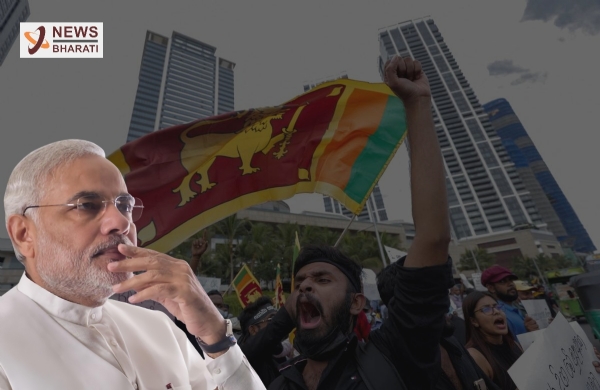Sri Lanka’s Economic crisis and its impact on India’s security
India has already signed with Sri Lanka a $1 billion credit line and is considering expanding it with another $1 billion in credits.
Total Views |
Sri Lanka is in the grips of an unprecedented economic crisis and is set to default on all its external debt. Its economy is in shambles with usable foreign reserves down to less than US$ 50 million, while it has to repay the international debt of US$07 billion this year and another $25 billion by 2026. The bulk of Lanka’s remaining reserves, including $1 billion equivalent SWAP facility from China, is not usable for settling dollar-denominated payments.
The bailout requested by Lanka from the International Monetary Fund [IMF] has not yet been approved by the latter, citing the fact that Sri Lanka’s $51 billion foreign debt is unsustainable. To help Lanka in its attempt at economic recovery, India has already signed a $1 billion credit line and is considering expanding it with another $1 billion in credits.

The economic crisis of Lanka is a direct consequence of the economic policies of the Rajapaksa family which control the crucial government positions which are distributed among the members of its own family. India is affected by the events there, not only because of the economic crisis but also the crisis of governance. There are extreme political forces at play in that country, from the political families striving to gain power, to the influence of Buddhist monks on governance policies, to the influence of the military, to the leftist/communist elements who are anti-IMF and World Bank.
Given the proximity of Lanka to the southern shores of India, our Nation and its government must take unprecedented actions to protect our southern borders. If the local political governance is not stabilized, the economic instability will lead to a civil war, which in turn will lead to masses of refugees, mostly of Tamil origin migrating to our country. The current political issues plaguing Lanka will not be easily resolved unless there is an external pressure to force an early and equitable resolution.
India has the financial capacity to underwrite Sri Lanka’s foreign debt. However, we should not do that without comprehensive collateral from the indebted Nation. What we should propose is a 99 years lease agreement to take over at least three provinces of Lanka. Essentially, India will control the economic and political issues of these provinces as part of India’s governance structure.
As per the 2012 census of the Northern Province; the Hindu population is 74.56%, Christians 19.27%, Muslims 3.22%, Buddhist 2.87% and others 0.09%. The province has chemical and cement factories, apparel factories, power plants and aqua-culture farming. Being an agricultural dominant province, its agri sector is 25.9%, trade sector of 19.3%, and service sector in hospitality industry of 31.2%. It has a existing railway network, Class A & B highways and an international airport in Jaffna.
The North-Western province consists of the majority population of Sinhalese (Therawada Buddhists), the Moors (Muslims) minority and the Tamils. Fishing, prawn farming and rubber-tree plantations are the prominent industries here. The region is linked with the rest of the country with an extensive rail and road transport system. Apart from the existing export processing zones, the province is rich in minerals; Silica sand, Limestone, Graphite, Mica, all required for the modern technologies of current times, and clay and ilmenite. Apart from a variety of agricultural produce, this province has a major fishing coastline.
Taking over these two provinces would essentially extend India’s southern border into the north-western part of Sri Lanka.
The third province to take on lease would be the Southern province, that is extremely important for India’s defence. The majority of the population is Buddhist, followed by the Muslims, the Hindus being the third largest, and Christians and others being the minority here. Subsistence farming and fishing is the main source of income for the vast majority of the people of this region. However, the critical factor to lease this province is the Hambantota port which is currently leased for 99 years to the Chinese for US$ 1.1 billion from July 2017 onwards. The Adani group made a US$ 700 million deal in this port area with the Sri Lanka port authority to build a deep-sea container terminal, where Adani group has a 51% stake. This has allowed India some control and access to this important port.
With India in control of these three provinces, backed by the financial strength of the growing Indian economy, and a stable governance structure; Sri Lanka can be pulled out of its current financial misery and turned around into a vibrant economy with a stable, non-corrupt administration. The advantage to India is the securing of the southern borders and reducing the Chinese military threat to a minimum. Upgrading the local industry and introduction of technology will enable large scale and stable employment for the locals, who are currently struggling to be gainfully employed. Local industrial development will also reduce the migration of Lankan locals to India and avoid the stress on the current infrastructure in Tamil-Nadu and Kerala.
The moot question is whether our current government will accept the need of this rather bold strategy. Our current Finance Minister and Foreign Minister have a South Indian heritage, and understand the cultural aspects of investing into Sri Lanka, along-with the economic and foreign strategy advantages. Our Prime Minister understands the importance of extending our borders of influence beyond our Nation’s physical borders. The current dismal situation in Lanka can be leveraged for India’s advantage, provided we make our global strategic move before China, USA or Russia decide to do the same.


